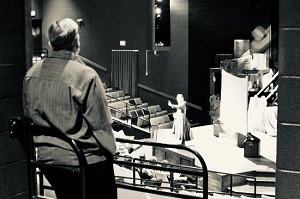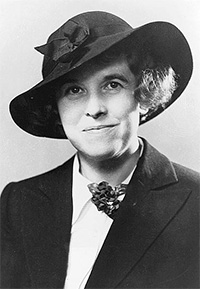Think of subtext as to the left of the language and not underneath it. –Sarah Ruhl
Riffing off Ruhl, my posts on dramaturgy are not necessarily faithful descriptions of my process but rather views of certain aspects of it from just to the left of the experience.
After The Three Keys of Captain Hellfire opened my director, David Lee-Painter (DLP) asked if I would dramaturg his next project, This Random World by Steven Dietz in the fall. The idea of researching someone else’s play was vaguely terrifying. I knew nothing about how to do it. In the past, I would’ve fled. This time I said, “Yes.”
So it was that I began learning dramaturgy and researching This Random World—I mean The Clean House.
A few weeks after we’d spoke, DLP messaged me. In about sixty days he would be directing The Clean House. On a whim, I sent him some articles on Sarah Ruhl.
From DLP: Can you also dramaturg Clean House?
I was so new to dramaturgy that I didn’t know what I was making or what it was called. And now he wanted two whatchamacallits. I did it.
Research is an immersive process for me. Consequently, I’m voracious in collecting information, possessed with a desire for thoroughness and continually frustrated by the nagging thought that I have not seen everything on the subject at hand.
When I compiled history notes on 18th century pirates for the cohort producing my play, I quickly came to the heartbreaking realization that not everyone is interested in the pictureless, scholarly articles that I savor. Crazy, I know.
That was my first lesson in dramaturgy.
Compiling my research on the two upcoming productions would involve rendering what I found down to its essentials. I wanted to create something informative and readable.
The Clean House & This Random World are shows well-suited for dual research. I found them to be different parts of a whole. They would make for a crazy double-bill but that was not the goal this time.
Both plays engage in making the familiar seem strange, bumping the audience into a different level of awareness, if only for a moment. Typically when attending the theatre, I anticipate becoming immersed in the story presented on the stage. These scripts deal with topics that are so much a part of our lives that it is necessary to bump us to prevent complete immersion. With a subtle shift, we as viewers watch something well-known “as if for the first time (Jestrovic).” From that prospective we are able to look at it, think about it, and respond to it consciously.
Johann described Ruhl’s style as “visionary and fantastical. As though the playwright has a shamanic role of reaching into the void and bringing back visions that explain us to ourselves (Johann).” The Clean House’s world has characters eating apples on a balcony and being able to chuck the remains into Lane’s home at a distant location. The two places exist in the play’s physical world and yet overlap in some fashion that allows apples to span distance and time. And they become more than apples. These symbols of original sin clutter Lane’s clean house with the messiness of a lived existence.
In This Random World, estrangement is the underlying architecture of Dietz’s story. He derailed the viewers’ expectation by having scenes happen offstage or not at all. “[Dietz says] ‘What if I subverted this? What if that was a list of scenes that cannot be in the play?’(Pender)”
A break-up is not shown to the audience but described by Claire after it has happened. Gary attempts to correct her narrative, but her story shapes what we understand happened. We are forced to rely on her interpretation of the event.
Dietz’s various characters are expected to meet and finally have a much anticipated encounter. They never do. Denying the audience this jars it into another view of the story and engenders a different response.
Both Dietz’s & Ruhl’s writing styles are different. I find Dietz’s to be more relaxed, easing me into the story and the ideas therein. His interviews read like casual conversations over coffee. His vision and process are apparent and relatable.
Ruhl crushes me with her philosophical background. The course I took in college made me feel like I was drowning as I struggled to understand the concepts presented and here I was once more. Drowning. It was a challenge to analyze her interviews and then apply them to her work, to understand the architecture she built. The Clean House was written crisply and sparingly. Sitting in the audience, I’m not aware of the architecture’s presence but studying the script, I see the overwhelming strength that structure gives to the entire work.
After studying and reflecting of the anatomy of their scripts, I reassembled them, stepped back, and looked at them holistically once more. Then I wrote up my findings. The Clean House packet was finalized and sent to DLP shortly before he left for rehearsals.
From DLP: GOLD – pure Gold. Is it possible to have this done for Dietz sooner rather than later so the team can ruminate on this GOLD earlier?
Oi.
It’s a good thing I love digging for buried treasure.
#DLPAnotherFineMess #theatre #dramaturgy
Photo by Daniel Haley
Jestrovic, Silvija. Making the Familiar Strange in Theatre and Drama: From Russian Formalist Avant-Garde to Brecht, dissertation, University of Toronto, 2002.
Johann, Susan. “Sarah Ruhl,” Focus on Playwrights, Portraits and Interviews, University of South Carolina Press, 2016. https://www.jstor.org/stable/j.ctv6wgmrn.17
Pender, Rick. “Ensemble Theatre Is Growing, Thriving in OTR,” Cincinnati CityBeat, Oct. 9, 2017. https://www.citybeat.com/arts-culture/theater/media-gallery/20978565/ensemble-theatre-is-growing-thriving-in-otr
Ruhl, Sarah. 100 Essays I Don’t Have Time to Write: On Umbrellas and Sword Fights, Parades and Dogs, Fire Alarms, Children, and Theater, Farrar, Straus and Giroux, 2015.

